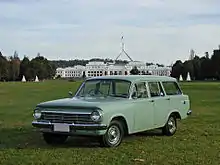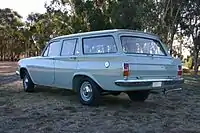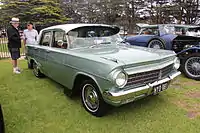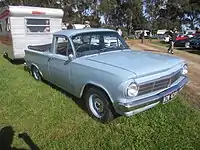Holden EH
The Holden EH is an automobile produced by General Motors-Holden in Australia from 1963 to 1965. The EH was released in August 1963[1] replacing the Holden EJ series, and was the first Holden to incorporate the new "Red" engine, with a seven main bearing crankshaft instead of the four main bearing crankshaft used in the "Grey" engine. At first, a larger capacity 149-cubic-inch (2,440 cc) engine was only sold attached to a three-speed manual gearbox or the "Hydramatic" four-stage automatic transmission with a column shift. The Controlled Coupling Hydramatic used in the EH was actually a four-stage, although it effectively worked as a three-speed unit, except at full throttle.[2] The 179-cubic-inch (2,930 cc) engine was initially sold only with the "Hydramatic" transmission. The first EH with a 179-cubic-inch engine and a manual gear box was called the "EH-S4", and was fitted with an upgraded manual gearbox, having stronger gears than in the 149 gear box, and an upgraded clutch. The three-speed manual column shift gearboxes had no synchromesh on first gear, only on the second and third (top) gear.
| Holden EH | |
|---|---|
.jpg.webp) Holden Special sedan | |
| Overview | |
| Manufacturer | General Motors-Holden's |
| Also called | Holden Standard Holden Special Holden Premier Holden Utility Holden Panel Van |
| Production | August 1963–February 1965 |
| Designer | Stan Parker |
| Body and chassis | |
| Class | Mid-size |
| Body style | 4-door sedan 5-door station wagon 2-door coupé utility 2-door panel van |
| Layout | FR layout |
| Powertrain | |
| Engine | 2.4L GMH '149' I6 2.9L GMH '179' I6 |
| Transmission | 3spd manual 3spd "Hydra-Matic" automatic |
| Dimensions | |
| Wheelbase | 106.0 inches (2692mm) |
| Length | 177.6 inches (4511mm) |
| Width | 68.0 inches (1727mm) |
| Height | 58.2 inches (1478mm) |
| Curb weight | 2464lb (1118kg) |
| Chronology | |
| Predecessor | Holden EJ |
| Successor | Holden HD |
A total of 256,959 EH Holdens were produced and sold from 1963 to 1965, when the EH was replaced by the Holden HD series.
Range
The Holden EH range was offered in the following models:[3]
- Standard Sedan [4]
- Standard Station Sedan [4]
- Special Sedan [4]
- Special Station Sedan [4]
- S4 Special Sedan [3]
- Premier Sedan [4]
- Premier Station Sedan [4]
- Utility [5]
- Panel van [5]
The Station Sedan name was used on all station wagon models.
"Standard" models were basic, with no side badging, and were mostly fitted with 149-cubic-inch engines, rubber floor mats and single-tone acrylic paint finish. "Special" models came equipped with stainless moulding strips all round, special badges and optional two-tone paint jobs, still in acrylic paint. The "Premier" was the top of the range model, with a 179-cubic-inch engine and Hydramatic transmission, leather interior, bucket seats, fold-down centre armrest in the back seat, carpets, metallic paint, a centre console incorporating a heater/demister, a diamond dot radio, a handbrake warning light and chrome-plated wheel trims. The Standard EH was the same price as its predecessor (EJ) at £1051.
The "S4 Special" was introduced in September 1963 for racing homologation purposes - a minimum of 100 were required to be built & sold. These featured a 179 engine, manual transmission with hardened gears, a 12 imp gal (55 L) fuel tank (9 imp gal (41 L) was standard), a more comprehensive tool kit, metal lined brake shoes and a larger tailshaft.[6] Six were produced at Holden's Melbourne's (Dandenong) plant and 120 in Sydney's (Pagewood) plant.[7]
.jpg.webp) Holden Standard Sedan
Holden Standard Sedan Holden Standard Station Sedan
Holden Standard Station Sedan Holden Standard Station Sedan
Holden Standard Station Sedan.jpg.webp) Holden Special Sedan
Holden Special Sedan.jpg.webp) Holden Special Station Sedan
Holden Special Station Sedan Holden Premier sedan
Holden Premier sedan_sedan_(20676517986).jpg.webp) Holden Premier sedan
Holden Premier sedan.jpg.webp) Holden Premier Station Sedan
Holden Premier Station Sedan Holden Utility
Holden Utility.jpg.webp) Holden Utility
Holden Utility.jpg.webp) Holden Panel Van
Holden Panel Van.jpg.webp) Holden Panel Van
Holden Panel Van
In popular culture
The Song "EH Leatherette", was recorded by The Detonators, am Australian Rockabilly band, in 2007
References
- Norm Darwin, 100 Years of GM in Australia, 2002, page 235
- EH Holden Owners Manual, General Motors - Holden, 1964 (Provided with car at purchase)
- Holden EH Technical Specifications Retrieved from www.uniquecarsandparts.com.au on 1 March 2009
- Sales brochure for EH series Holden Sedans and Station Sedans
- Sales brochure for EH series Holden Utility and Panel Van
- 1963 Holden EH, The Holden Heritage Archived 6 January 2009 at the Wayback Machine Retrieved from www.holden.com.au on 1 March 2009
- 1963 EH Holden Special S4, Australian Muscle Car, Issue 9, pages 80-86
External links
- A Brief History of the EH Holden Retrieved from The Sixties Holden Archives on 1 March 2009
- EH Holden - Ranleys